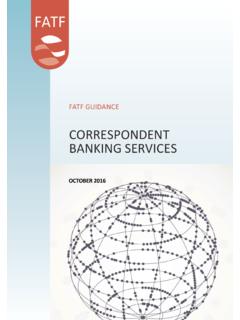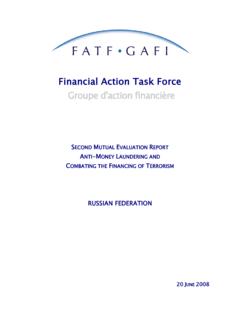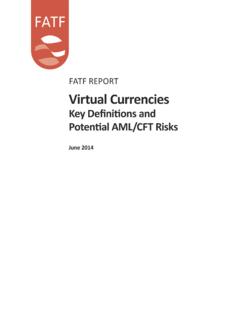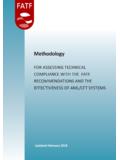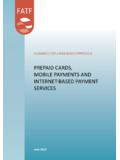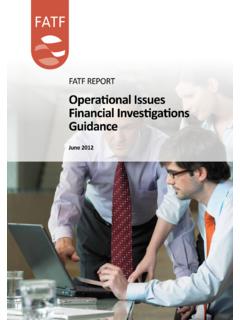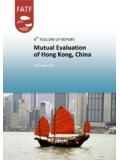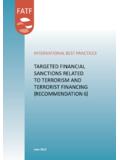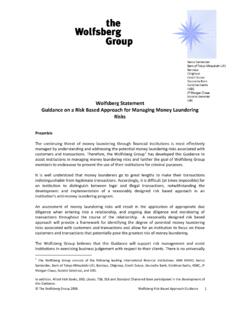Transcription of poliTicAlly exposed persons - FATF-GAFI.ORG
1 FATF GuidAnce poliTicAlly exposed persons (recommendations 12 and 22)June 2013 FINANCIAL ACTION TASK FORCE The Financial Action Task Force (FATF) is an independent inter-governmental body that develops and promotes policies to protect the global financial system against money laundering , terrorist financing and the financing of proliferation of weapons of mass destruction. The FATF Recommendations are recognised as the global anti - money laundering (AML) and counter-terrorist financing (CFT) standard. For more information about the FATF, please visit the website: 2013 FATF/OECD. All rights reserved. No reproduction or translation of this publication may be made without prior written permission. Applications for such permission, for all or part of this publication, should be made to the FATF Secretariat, 2 rue Andr Pascal 75775 Paris Cedex 16, France (fax: +33 1 44 30 61 37 or e-mail: FATF GUIDANCE poliTicAlly exposed persons (RECOMMENDATIONS 12 AND 22) 2013 1 CONTENTS ACRONYMS.)
2 2 I. INTRODUCTION .. 3 II. DEFINITIONS .. 4 III. THE RELATIONSHIP BETWEEN RECOMMENDATIONS 10 (CUSTOMER DUE DILIGENCE) AND RECOMMENDATION 12, AND THE SPECIFIC REQUIREMENTS FOR PEPS.. 5 A. Foreign PEPs .. 7 B. Domestic and International organisation PEPs .. 8 C. Identification of Beneficial Owners .. 9 Beneficiaries of life insurance policies .. 10 IV. SCOPE OF RECOMMENDATION 12 .. 10 A. Prominent public function .. 10 B. Time limits of PEP status .. 12 C. Family members and close associates .. 12 V. GUIDANCE ON THE USE OF SOURCES OF INFORMATION FOR THE DETERMINATION OF PEPS, THEIR FAMILY MEMBERS & CLOSE ASSOCIATES .. 13 A. Ensuring client CDD information is up-to-date .. 14 B. Employees .. 14 C. Internet and media searches .. 14 D. Commercial databases .. 15 E. Government issued PEP-lists .. 16 F. In-house databases and information sharing within financial groups or countries .. 17 G. Asset disclosure systems .. 17 H. Customer self-declarations.
3 18 I. Information sharing by competent authorities .. 18 VI. MEASURES APPLICABLE TO THE DIFFERENT TYPES OF PEPS .. 19 A. Foreign PEPs and high risk business relationships with domestic & international organisation PEPs .. 19 Obtain senior management approval .. 19 Establish the source of wealth and source of funds .. 20 Conduct enhanced ongoing monitoring of the business relationship .. 22 B. Domestic & international organisation PEPs when not higher risk .. 23 C. Life insurance policies with higher risks .. 23 VII. SUPERVISION .. 23 Internal controls (Recommendation 18) .. 25 VIII. OTHER ISSUES .. 25 A. Immunity from prosecution and conviction .. 25 B. Consistency with anti -discrimination laws .. 25 C. Sharing of best practices between business associations .. 26 ANNEX 1: PEPS RED FLAGS / INDICATORS .. 27 ANNEX 2: SOURCES OF CASE 33 FATF GUIDANCE poliTicAlly exposed persons (RECOMMENDATIONS 12 AND 22) 2 2013 ACRONYMS AML/CFT anti - money laundering / Countering the Financing of Terrorism CDD Customer Due Diligence DNFBPs Designated Non-Financial Business or Professions FIU Financial Intelligence Unit ML money laundering PEP poliTicAlly exposed Person STR Suspicious Transaction Report TF Terrorist Financing UNCAC United Nations Convention against Corruption FATF GUIDANCE poliTicAlly exposed persons (RECOMMENDATIONS 12 AND 22) 2013 3 I.
4 INTRODUCTION 1. A poliTicAlly exposed person (PEP) is defined by the Financial Action Task Force (FATF) as an individual who is or has been entrusted with a prominent public function. Due to their position and influence, it is recognised that many PEPs are in positions that potentially can be abused for the purpose of committing money laundering (ML) offences and related predicate offences, including corruption and bribery, as well as conducting activity related to terrorist financing (TF). This has been confirmed by analysis and case studies. The potential risks associated with PEPs justify the application of additional anti - money laundering / counter-terrorist financing (AML/CFT) preventive measures with respect to business relationships with PEPs. To address these risks, FATF Recommendations 12 and 22 require countries to ensure that financial institutions and designated non-financial businesses and professions (DNFBPs) implement measures to prevent the misuse of the financial system and non-financial businesses and professions by PEPs, and to detect such potential abuse if and when it occurs.
5 2. These requirements are preventive (not criminal) in nature, and should not be interpreted as stigmatising PEPs as such being involved in criminal activity. Refusing a business relationship with a PEP simply based on the determination that the client is a PEP is contrary to the letter and spirit of Recommendation 12. 3. The FATF first issued mandatory requirements covering foreign PEPs, their family members and close associates1 in June In February 2012, the FATF expanded the mandatory requirements to domestic PEPs and PEPs of international organisations, in line with Article 52 of the United Nations Convention against Corruption (UNCAC).3 Article 52 of the UNCAC defines PEPs as individuals who are, or have been, entrusted with prominent public functions and their family members and close associates , and includes both domestic and foreign PEPs. The main aim of the obligations in Article 52 of UNCAC is to fight corruption, which the FATF endorses.
6 However, it is important to note that the aim of the 2012 FATF requirements extends more broadly to the fight against ML and its predicate offences (designated categories of offences), including corruption, and TF. 4. Consistent with this objective, Recommendation 12 requires countries to implement measures requiring financial institutions to have appropriate risk management systems in place to determine whether customers or beneficial owners are foreign PEPs, or related or connected to a foreign PEP, and, if so, to take additional measures beyond performing normal customer due diligence (CDD) (as defined in Recommendation 10) to determine if and when they are doing business with them. 5. For domestic PEPs and international organisation PEPs, financial institutions must take reasonable measures to determine whether a customer or beneficial owner is a 1 See the 2003 FATF 40 Recommendations: Recommendation 6 (for financial institutions) and Recommendation 12 (for DNFBPs).
7 2 The 2003 FATF Recommendations encouraged countries to extend the requirements to domestic PEPs. 3 The UNCAC is also referred to as the M rida Convention, after the Mexican city where the high level signing Conference was held. The UNCAC was adopted by the United Nations General Assembly in October 2003, and subsequently entered into force in December 2005. FATF GUIDANCE poliTicAlly exposed persons (RECOMMENDATIONS 12 AND 22) 4 2013 domestic/international organisation PEP, and then assess the risk of the business relationship. For higher risk business relationships with domestic PEPs and international organisation PEPs, financial institutions should take additional measures consistent with those applicable to foreign PEPs. 6. Recommendation 12 applies to financial institutions, and Recommendation 22 requires countries to apply these requirements to DNFBPs. 7. Effective implementation of the PEPs requirements has proven to be challenging for competent authorities, financial institutions and DNFBPs worldwide.
8 This is evident from the results of the assessments of compliance with the 2003 FATF 40 Recommendations, undertaken by the FATF, FATF-style regional bodies, International Monetary Fund and World Implementation challenges have also been identified through publicly available supervisory reports and regulatory actions, and high profile cases of (former) government leaders and their relatives who appeared to have significant assets available abroad which were inconsistent with their official or licit income. 8. It is also important to note that the effective implementation of Recommendations 10, 12 and 22 have to be part of a full and effective implementation of the FATF Recommendations as a whole. See the Reference Guide and Information Note on the Use of the FATF Recommendations to Support the Fight Against Corruption. 9. This guidance paper is non-binding and should be read in conjunction with FATF Recommendations 12 and 22, and their Interpretive Notes.
9 It is a guidance tool that is based on the experiences of countries, international organisations, the private sector and non-governmental organisations, and which may assist competent authorities and financial institutions and DNFBPs to effectively implement those Recommendations. II. DEFINITIONS 10. For the purpose of this guidance paper, the definitions set out in the Glossary to the FATF Recommendations The FATF Glossary definition of poliTicAlly exposed person is meant to have the same meaning as the term persons with prominent public functions (as used in UNCAC Article 52). 11. In particular, the following definitions, which do not cover middle ranking or more junior individuals, apply to this guidance paper: Foreign PEPs: individuals who are or have been entrusted with prominent public functions by a foreign country, for example Heads of State or of government, senior politicians, senior government, judicial or military officials, senior executives of state owned corporations, important political party officials.
10 4 All FATF Mutual Evaluations are published on the website of the FATF, , which also holds links to the websites of the FATF-style regional bodies, the IMF and World Bank. See the assessment of Recommendations 6 and 12 of the 2003 FATF 40 Recommendations in each of these reports. 5 See in particular, the Glossary definitions of: beneficial owner, competent authorities, country, criminal activity, financial institutions, designated non-financial businesses and professions, international organisations, poliTicAlly exposed person, reasonable measures, risk, satisfied, should, and supervisors. FATF GUIDANCE poliTicAlly exposed persons (RECOMMENDATIONS 12 AND 22) 2013 5 Domestic PEPs: individuals who are or have been entrusted domestically with prominent public functions, for example Heads of State or of government, senior politicians, senior government, judicial or military officials, senior executives of state owned corporations, important political party officials.
